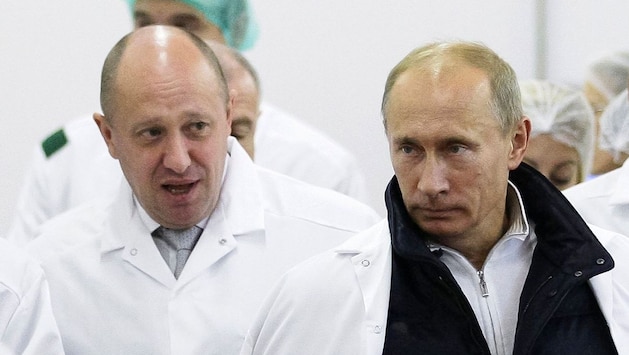The mercenary group Wagner was decisive in many Russian advances – probably also in Soledar. Wagner boss Prigozchin’s obsession with conquest is said to have economic motives above all.
Russia is apparently on the verge of conquering the small Ukrainian town of Soledar. For weeks, Wagner boss Yevgeny Prigozhin unscrupulously sent former prison inmates to the front. The bodies of the mercenaries were left on the field.
Prigozhin obviously sees his actions as a success. On Wednesday night he published a picture of himself and his soldiers from one of the region’s salt mines. And emphasized that only his people were responsible for conquering large parts of Soledar.
Prigozhin’s obsession with conquest also has economic motives, a White House spokesman said. Because he has already secured raw materials for his troops’ operations in the past, for example wood in South Africa or oil from Syria.
Prigozhin is first and foremost an “entrepreneur”, as can also be read in his Wikipedia entry. Among other things, he runs the catering company “Konkord”.
But Prigozhin owes its fame to another company. He founded the military company PMC Wagner, also known as the Wagner Group. According to US information, it will be financed by Prigozhin himself.
Its soldiers, who are considered extremely brutal, fight in Africa and Syria. For several months, the Wagner group has also been involved in the Ukraine war, fighting for Russia on the front line.
So it is that Prigozhin became a key figure in the Ukraine war. According to US estimates, the deployment of his soldiers will cost 100 million US dollars every month. This emerges from a report in the “Tagesschau”.
What distinguishes Prigozhin, what sets him apart from others, is the amalgamation of war and raw material interests. He was also accused of this in the Soledar region, where salt and gypsum deposits lie dormant.
After all, the Wagner boss wrote on Telegram: “The icing on the cake is the mine system of Soledar and Bachmut, which is actually a network of underground cities”.
Prigozhin has since denied that he was interested in salt in Soledar. However, his focus on raw materials is well known, explains Gerhard Mangott, Professor of Political Science at the University of Innsbruck, in an interview with FOCUS online.
“The Wagner group costs Prigozhin a lot of money due to the high wages and equipment requirements, and Prigozhin also wants to earn a lot from it,” he says. “Therefore, the use of mercenaries in the Middle East, in North and Central Africa is always accompanied by access to raw material deposits.”
For example, Prigozhin was able to secure oil in Syria or timber in Central Africa. According to Mangott, he earns much more with this than with his Konkort restaurant chain.
For Putin, the Wagner Group’s efforts in Africa are also paying off. The Kremlin boss is said to be looking for alliances with governments that are shunned by the West or are struggling with other political challenges, reports the editorial network Germany.
The principle is simple: the African leaders get recognition from the Kremlin and military support from the Wagner group. The affected countries retaliated by granting Russia access to oil, gas, gold and diamonds. Prigozhin thus plays a key role in Russia’s Africa plan.
If you know which devices at home use how much electricity, you can make targeted savings. Our e-paper shows which devices use how much electricity for all common household appliances, from ovens and hobs to refrigerators and washing machines to TVs and WLAN routers. There are also a number of instant power-saving tips.
Even if it is not known in detail which resources Prigozhin had access to, Mangott believes that he does not just use his mercenaries out of “love of the fatherland” or “ideological blindness”.
The professor says: “He wants to make a fortune with it. It can therefore be assumed that the deployment in the Ukraine war will more than pay off for him”. Yet another reason would drive Prigozhin.
According to Mangott, he wants to use the military successes of the Wagner Group to climb the political hierarchy in Russia. The expert says: “He probably succeeded, even if he didn’t reach the inner circle of power around Putin”.
Putin’s shadow army – mercenary group Wagner: What you should know about the killers
Gerhard Mangott is a professor of political science with a special focus on international relations and security in the post-Soviet space. He teaches at the Institute for Political Science in Innsbruck and is a lecturer at the Diplomatic Academy in Vienna















